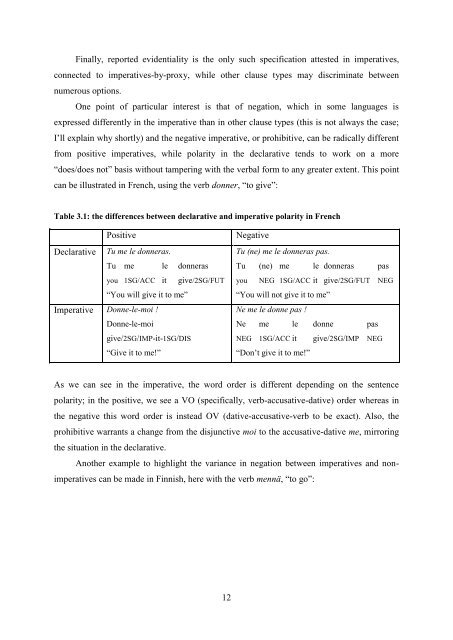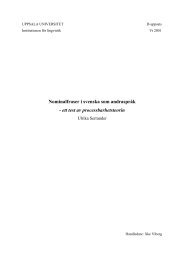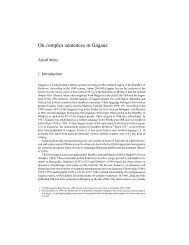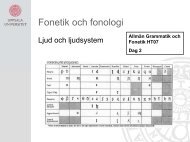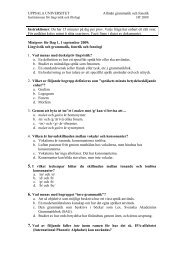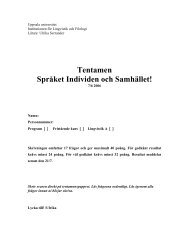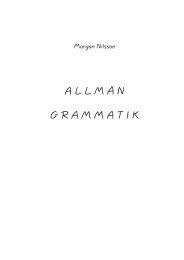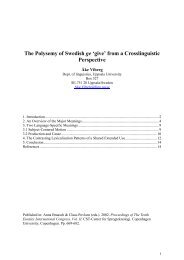The function of non-canonical imperatives in the languages of Europe
The function of non-canonical imperatives in the languages of Europe
The function of non-canonical imperatives in the languages of Europe
You also want an ePaper? Increase the reach of your titles
YUMPU automatically turns print PDFs into web optimized ePapers that Google loves.
F<strong>in</strong>ally, reported evidentiality is <strong>the</strong> only such specification attested <strong>in</strong> <strong>imperatives</strong>,<br />
connected to <strong>imperatives</strong>-by-proxy, while o<strong>the</strong>r clause types may discrim<strong>in</strong>ate between<br />
numerous options.<br />
One po<strong>in</strong>t <strong>of</strong> particular <strong>in</strong>terest is that <strong>of</strong> negation, which <strong>in</strong> some <strong>languages</strong> is<br />
expressed differently <strong>in</strong> <strong>the</strong> imperative than <strong>in</strong> o<strong>the</strong>r clause types (this is not always <strong>the</strong> case;<br />
I’ll expla<strong>in</strong> why shortly) and <strong>the</strong> negative imperative, or prohibitive, can be radically different<br />
from positive <strong>imperatives</strong>, while polarity <strong>in</strong> <strong>the</strong> declarative tends to work on a more<br />
“does/does not” basis without tamper<strong>in</strong>g with <strong>the</strong> verbal form to any greater extent. This po<strong>in</strong>t<br />
can be illustrated <strong>in</strong> French, us<strong>in</strong>g <strong>the</strong> verb donner, “to give”:<br />
Table 3.1: <strong>the</strong> differences between declarative and imperative polarity <strong>in</strong> French<br />
Positive<br />
Declarative Tu me le donneras.<br />
Tu me le donneras<br />
you 1SG/ACC it give/2SG/FUT<br />
“You will give it to me”<br />
Imperative Donne-le-moi !<br />
Donne-le-moi<br />
give/2SG/IMP-it-1SG/DIS<br />
“Give it to me!”<br />
Negative<br />
Tu (ne) me le donneras pas.<br />
Tu (ne) me le donneras pas<br />
you NEG 1SG/ACC it give/2SG/FUT NEG<br />
“You will not give it to me”<br />
Ne me le donne pas !<br />
Ne me le donne pas<br />
NEG 1SG/ACC it give/2SG/IMP NEG<br />
“Don’t give it to me!”<br />
As we can see <strong>in</strong> <strong>the</strong> imperative, <strong>the</strong> word order is different depend<strong>in</strong>g on <strong>the</strong> sentence<br />
polarity; <strong>in</strong> <strong>the</strong> positive, we see a VO (specifically, verb-accusative-dative) order whereas <strong>in</strong><br />
<strong>the</strong> negative this word order is <strong>in</strong>stead OV (dative-accusative-verb to be exact). Also, <strong>the</strong><br />
prohibitive warrants a change from <strong>the</strong> disjunctive moi to <strong>the</strong> accusative-dative me, mirror<strong>in</strong>g<br />
<strong>the</strong> situation <strong>in</strong> <strong>the</strong> declarative.<br />
Ano<strong>the</strong>r example to highlight <strong>the</strong> variance <strong>in</strong> negation between <strong>imperatives</strong> and <strong>non</strong><strong>imperatives</strong><br />
can be made <strong>in</strong> F<strong>in</strong>nish, here with <strong>the</strong> verb mennä, “to go”:<br />
12


